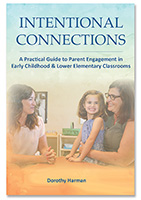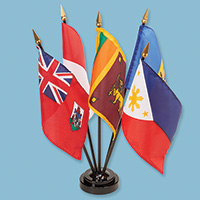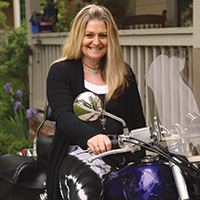
 We recently interviewed Dorothy Harman, a Montessori teacher, teacher-trainer, and author of the new book, Intentional Connections. With grace and humor, Dorothy discusses what brought her to Montessori education and what inspired her to write this book, among other topics.
We recently interviewed Dorothy Harman, a Montessori teacher, teacher-trainer, and author of the new book, Intentional Connections. With grace and humor, Dorothy discusses what brought her to Montessori education and what inspired her to write this book, among other topics.
(Irene Baker) How did you discover Montessori education?
(Dorothy Harman) Many people in my family were involved in education, including my mother, who was a school bus driver. When I was an undergraduate, looking at majoring in education versus nursing, I noticed that nursing paid so much better. Clearly, I thought, I'm supposed to be a nurse. I went to my first anatomy lab and passed out cold on the floor. When I came to, someone walked me over to the education department and I changed my major immediately!
Then a neighbor, whose little boy was going to a Montessori school, asked me if I had heard of Montessori. She said, "What impresses me most is that he's learning his continents."
I thought, "What? He's only three!" I wanted to check this out because the thought of young children working with continents intrigued me. I went into the classroom and was awestruck by the puzzle maps and the flags.
Their beauty drew me right in. I spent the morning observing the grace and poise of the children and their engagement with their work. It just grabbed me and held me tightly.
 When I read Aline Wolf's book, Nurturing the Spirit, it felt like a homecoming. I thought, "Oh, I didn't know people thought like me. Apparently, these are my people."
When I read Aline Wolf's book, Nurturing the Spirit, it felt like a homecoming. I thought, "Oh, I didn't know people thought like me. Apparently, these are my people."
I did my training in Nebraska. My children attended the Montessori public school where I teach.
(IB) How long have you been a Montessori teacher?
(DH) This starts my 23rd year.
(IB) What inspired you to write your book, Intentional Connections?
(DH) Well, it was an interesting journey. I had wonderful experiences connecting with parents when I lived in California and homeschooled ten children, including my own two young children. It was a small community. The intimacy and connectedness I felt with those parents was wonderful. We did everything together, such as potlucks and outdoor projects, including building a gold mine in my backyard! Those experiences started to shape my whole ideology about partnering with parents.
When I was asked to train Montessori teachers, one of the courses I taught was Parenting and Community Involvement. I included the most recent research about outcomes for children when parents connect with teachers.
I started paying attention to conversations I heard in teachers' lounges and at conferences. Many teachers said, "I love my job but oh, those parents." I thought, "Wow, we're really missing the mark for partnerships."
We can change our opinions and feelings about our relationship with parents. To create connection, I began enticing parents to be involved with my classroom without having to physically be there. In most settings it's a luxury for working parents to come into the classroom.
It wasn't my intention to write a book, but with lots of encouragement, it came to fruition. I wanted to give teachers the opportunity to reflect on their practices and their ideas about parents. We begin with controlling our feelings, ideas, and reactions.
Montessori's cosmic ideas about our interconnections and our interdependence on one another have always resonated with me. I know that you can't change the world, but I'm okay with working on changing this little part of it.
(IB) What feedback have you gotten from teachers about your book?
(DH) The teachers absolutely adore Bud the Bear, the stuffed animal and home ambassador who visits children's families. It provides parents the opportunity to be part of the classroom, because they write in Bud's journal. It's their words, it's their handwriting. For example, "We had this to eat for dinner." And it may be an Indian or Vietnamese dish. These journal entries give me a snapshot of the children's world when they go home. This activity is powerful and easy to implement.
(IB) Do you have other ideas about how to include parents, especially immigrant families or parents who don't speak much English?
(DH) I'm very fortunate, because I work in a public school that has the English Language Learner program. So, I have the opportunity to walk the talk. It's easy to be in a group of Montessorians and talk about peace education when everyone is thinking the way you do. But you get to practice it when you're in a community with people who have different perspectives.
I lived in Germany for four years, so I know how it feels to be separated by language. I now have translators who come to parent-teacher conferences. That's a real asset. It puts the parents at ease to be able to speak in their mother tongue. I reiterate with those families that "we'll do this together."
I had one mother who spoke very limited English. She kept asking, "Can you help her [my daughter]? Can you help her?"
My response to her was "together." When this was translated to her, it filled her eyes with tears. Just that one word resonated tremendously with her.
Another activity that helps parents feel a part of the classroom is one I call Mini Masterpieces. It's so easy for a parent and child to decorate a heart or stone together. The child adds the Mini Masterpiece to the classroom display reporting, "I made this with my Dad!"
Parents really enjoy research projects with their children about the continent we're studying. I give parents three simple questions to ask their children: "What do I know? What do I want to know? What did I learn?" Parents report, "I didn't have to do the research for my child. I did it with them. I really do make a difference."
At circle time I'll ask if children have any research to share and hands go up. They can read it or I'll read it for them. The children are so proud because suddenly they are the experts on something like howler monkeys of South America, for example. That's the beauty of peer teaching in Montessori.
(IB) You were awarded a Peace Seed grant from the American Montessori Society?
(DH) Yes. It was for a little free pantry for people in the community with food insecurities. The children in my class finished off the pantry by hammering the trim and painting it. It's located around the corner from the school and we have community partners that help keep an eye on it too. You can just drive up, unhook the door, and take what you need, or drop off food to share. Children bring in canned food donations and many of the classes walk over to the pantry on a regular basis to stock the pantry. Last winter was very cold in Nebraska and the lower elementary made scarves to donate.
I share with parents how important it is for children to experience what giving feels like. Children get so excited, "I dropped off three pairs of mittens and when I went back, they were gone!" For a young child, that concreteness is important—it was here two days ago, and now it's gone. They know that they made a difference for someone. You can't teach that. You can only experience it.
(IB) In your book you discuss how teachers can prepare for difficult conversations with parents.
(DH) There has to be intentional, consistent energy put towards developing relationships with parents. When the framework and rapport has already been established, it's easier to work together on a concern. When we've had the opportunity to do some fun things together, like doing a craft project or sharing Bud the Bear, it's a lot easier to engage in those difficult conversations and remember that we're working towards a common goal.
I truly believe that our intention and the language we choose helps those conversations go more smoothly. What I have found is that the more transparent you are with parents about the importance of the parent-teacher relationship, the more positive the impact is on the children.
The opportunity for growth for all parties—the child, the parent, and the teacher—is a much more Montessori way to look at problem-solving. Those conversations can be uncomfortable, yet learning often occurs when we have discomfort. After working together with parents, we take that wisdom into the next experience and really hone our art as teachers.
(IB) I love your emphasis on building trust.
(DH) Sometimes it's parent and teacher together, holding hands, shaking our heads and not having the answers. We can't always resolve the issue, but it sure is comforting to know we're in it together.
(IB) Do you still ride your purple motorcycle?
 (DH) I do! There's nothing quite like the sensorial rush of fragrances going up your nose at 55 miles an hour, especially in the fall and the spring.
(DH) I do! There's nothing quite like the sensorial rush of fragrances going up your nose at 55 miles an hour, especially in the fall and the spring.
I also play drums and sing in a rock-and-roll band with my husband. It's really fun when children from my school come to our show, get up on stage, take an egg shaker and become part of the band.
(IB) What are your future plans?
Well, I didn't know I was going to write and that has become a part of who I am. Heads of schools are asking me to write a second book for parents. I'd like to write a book for children about intentional connections. I'm also looking at doctorate programs.
I'm still in the classroom and probably will be for the next six to ten years. That's my first and foremost love, being with the children and experiencing with them every day. One of my assistants calls me "The Marshmallow, " because the first time a child reads, my eyes fill with tears. So, I'll be sitting on the floor with children until I have to be rolled out of the building!
I chose the title of my book, Intentional Connections, because it is the connections that brought me to Montessori. When I saw those beautiful geography materials, I knew it had to do with learning about and connecting with one another. I hope that's complimented in my work, because that's the heart with which I entered into this work, wanting to do right by Montessori's legacy.
(IB) I think it's clear that you have. Thank you for the gift you've given teachers with your book.
—by Irene Baker, MEd, Montessori Educational Consultant at Montessori Services. She holds both primary (ages 3-6) and elementary (ages 6-12) Montessori certifications and has taught at all three levels. For over 20 years, she has served as a Montessori consultant and teacher-trainer for primary and elementary levels, and has presented workshops for teachers at schools and AMS conferences. Her work with students and teachers is infused with her passions: storytelling, history, social justice, non-violent (compassionate) communication, poetry, meditation, music, and the natural world.
—Originally Published 2019